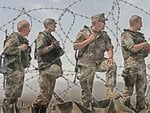A
Anonymous
Guest
redcoat said:Not true.RG_Lunatic said:If you research it a little more you will see that very few Americans had eyes on Canada, even in 1812.
While the taking of Canada was not a stated aim of the US in declaring war in 1812, it was the aim of a powerful political faction within the US Congress, the 'War Hawks', and a major reason the vote for war was passed.
http://college.hmco.com/history/readerscomp/rcah/html/ah_090300_warhawks.htm
The Warhawks made up a very small part of the US congress in 1812. To put things in context here's a quote from another page of the same webstie you've referenced:
Beginning in 1810 young Democratic-Republican "War Hawks" from the West and the South argued that the right to export American products without losing ships and men had to be defended. They also objected to the British inciting the Indians along the Great Lakes frontier and argued that the British would be forced to change their policies if the United States attacked Canada. Some believed that the future of republican government was in danger if the United States could not successfully defend its rights. Others hoped that if Canada was conquered it could be retained after the war.
http://college.hmco.com/history/readerscomp/rcah/html/ah_090500_warof.htm
As you can see, only a small portion of the Warhawks were interested in possible territorial gains in Canada. Others were interested in territorial gains against Spain. But mostly it was about impressment and British policy toward the American merchant. Territorial acquisitions were not enough to cause the war, and even without that possiblity the impressment and theft of ships/cargos was enough on its own.
redcoat said:plan_D said:The treaty of Ghent had already been signed before the New Orleans battle, the war was already decided as a draw.
RG_Lunatic said:Yes, but neither commander knew of this. The point is that had the war continued, the Americans were getting stronger and the British weaker in their relative ability to do battle.
It was the other way round.
By late 1814 the war against France was ending, and Britain was beginning to transfer more of its forces to North America. while the US was bankrupt, and the war was by then highly unpopular.
The New England states were even starting to make noises about breaking away from the Union. ( Hartford convention)
Conneticut was the only State that was seriously considering cessession. And after the Battle of Baltimore and then the Battle of New Orleans victories their cause was finished and most of their leadership was quickly driven out of the USA and all were driven out of political power.
Britain was spent from the war with Napolean. Something like 40% of the British population was under 18 years of age, and another 30% were over the age of 45. And figures for males would be even worse (i've not been able to find any). A huge proportion of abled bodied fighting men were in the RN, and not very suited to ground combat which is what would have been required. And a large number of the 25-30% of service age males were in fact not able-bodied due to wounds recieved during the Napoleanic war.
Britain was in no position to be deploying large numbers of forces across the Atlantic after having spent itself in a dozen years of war against Napolean. Furthermore, just because the war was over did not mean that Britain could afford to send its entire army, or even a large portion of it, across the ocean to fight an extended war in the Americas. That would have put Europe at risk.
While the War of 1812 was unpopular with the Americans during most of its course, after the Battle of Baltimore that largely changed, and after the victory at New Orleans it completely changed.
As for the US being bankrupt, only for international trade. Had the USA had to continue the war, it would have issued script which would have been honored within the internal economy which was healthy. In fact this happened immeadiately after the war with no problems.
RG_Lunatic said:ps, I was the guest poster
I didn't realize I wasn't logged on
NP. I hope you can understand that it is much better to post under an identity than to share the "Guest" identity which could horribly confuse a thread.
=S=
Lunatic

